| |
Are You Ready for Some Football!!
The Germans have always had a fascination with American culture,
jazz and American movies were popular in pre war Germany at least
until the Nazis came to power. The former was quickly driven
underground as "decadent" and the later disappeared during the war
years. Interestingly, in the DDR, they made cowboy movies with a
communist message in the 1960s. Football, a game central to American
culture, became an export item to Germany in 1950 and again in 1995.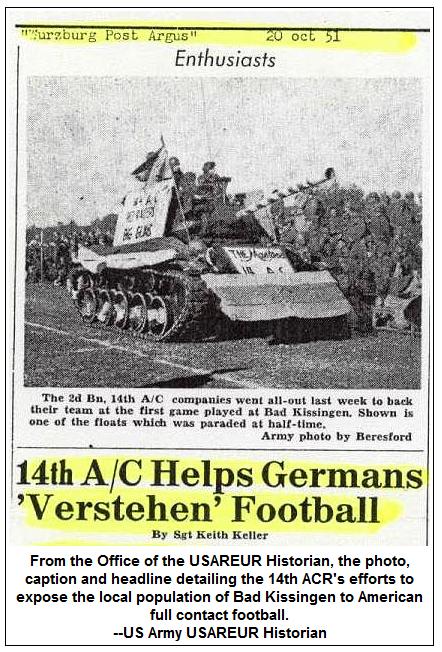
What a curious game to invite Germans to watch; it starts then it
stops, then it starts again. It has an odd shaped ball that
sometimes they run with, sometimes they throw, not very well, and
sometimes they kick, again, not very well ... on occasion they drop
it and everyone chases it! All Germans understand soccer and play if
from early childhood, but what were they to make of American
football???
Amerika Haus - Bad Kissingen
The immediate years of the post war occupation of Germany and then
the first days of the Cold War required careful monitoring by the
United States State Department. Twenty - five cities were selected
as "listening posts", Bad Kissingen was one of them. Career State
Department employee, Warrick E. Elrod, recalls his period in Bad
Kissingen and the first big football game in that corner of Bavaria
."I was assigned to the Amerika Haus in Bad
Kissingen as a very young staff member and we had a nice building in
the Kurstadt. We really played two roles, on the one hand, the Haus
was designed to be a window to display American culture and society
to the Germans who were very curious about America. We had an open
reading room with a good selection of US newspapers, out of date
somewhat, magazines and books to display how an "open democratic
society" could flourish. We also provided public speakers to discuss
the USA, the emerging post war Europe and looming Cold War. Our
other role was to observe local German society and report to the
State Department on areas of concern."
"So, we monitored things like the level of success of the de-nazification
program, or more correctly, were they creeping back into politics
and civil life, were the communists hard at work trying to subvert
our programs to establish open labor and trade organizations and,
once the DDR was established as a Soviet client state, and what
could be learned from Germans who had fled to the West. We were
salesmen, information gathers and report writers."
"I think in BK, there were only a few times we were directed to
watch for anything of particular note, there once was a scare of
some local former Nazis trying to drum up support and then, later,
we did a lot of interviews of people who had fled to the West. I
think the Amerika Haus in Bad Kissingen was closed in the early or
mid 1950s. They remained open in the larger cities through the Cold
War and to this day, I think there is still one in Munch and
Berlin."
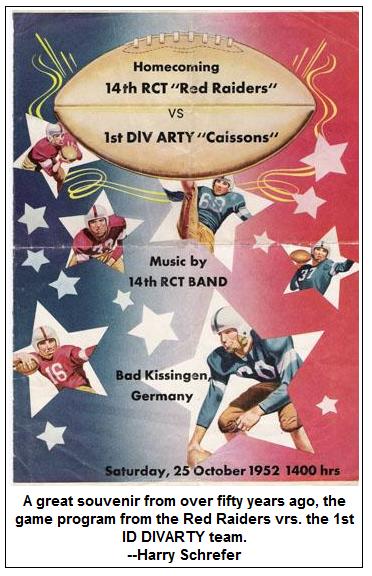
"We had very little to do with the American soldiers in BK, at least
on an official level. I guess we probably knew some of the officers
and on occasion, troops would visit the reading room. Really, the
soldiers and their daily contacts with the Germans were as effective
as anything else in terms of displaying what was best in our
culture. I recall the Army invited the town to watch a football
game. I think the Germans liked the Constabulary band at half-time
the best."
We Invite Our German Friends ...
Baseball or at least something that closely resembled it was played
in the camps of the Union Army in the Civil War and basketball can
be played indoors or out, rain or shine with minimal equipment, the
sport that really caught on with the US Army in the post war period
in Germany was football. As comedian James Carlin notes, the
language of the game is drawn from the military texts, the teams
march down the field, the "bomb" and the "blitz" vie for advantage.
Each play is a mini FRAGO, it’s all about execution of a plan based
on speed, power, training and teamwork. If football had not evolved
in the coal towns of central Pennsylvania, the Army surely would
have invented it. For the 2nd Battalion of the 14th Armored Cavalry
Regiment in Bad Kissingen, in the early days of the Cold War,
football was more than a sport, had passed passion and approached
obsession. Maybe the local Germans would enjoy learning about the
game???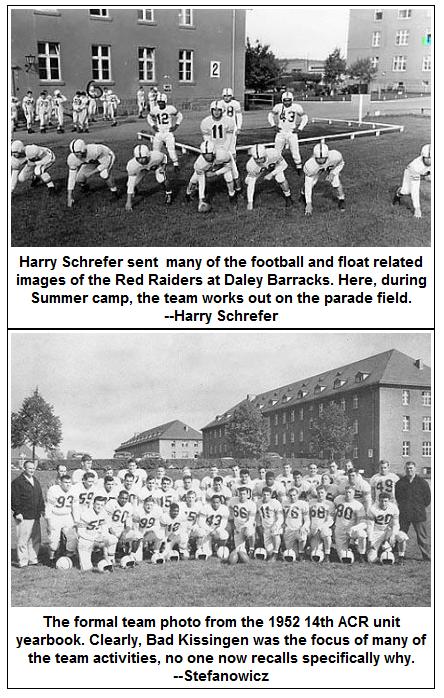
From the Office of the USAREUR Historian, the below article that
appeared in the US Army Wurzburg Post Argus, 20 Oct 1951, written by
SGT Keith Keller.
14th A/C Helps Germans ‘Verstehen‘ Football
Bad Kissingen (14th A/C)
"With a little background work by the 2d Bn, 14th Armd Cav stationed
here, the local citizens try to ‘verstehen‘ the rules of American
football. In trying to establish better American - German
relationship, the 2d battalion prepared and translated into German a
6 page program explaining the rules and highlights of American
football."
"This German program was added as an annex to the American program
distributed at all EUCOM games. In addition, a German announcer
explained the plays as they happened. That this plan was a success
could be seen when more than one thousand spectators of the local
German population were cheering the hometown team along as well and
as loud as the members of the 2nd battalion."
"A mile ride from the Officer’s Club to the sports field was made a
little more pleasant as members of the 84th Constabulary Band on a
horse drawn carriage serenaded the procession of more than 20 horse
drawn buggies. As the caravan approached the field, LTC James R.
Spurrier, the CO of the 2nd battalion dismounted and led his staff
and men of the battalion on to the football field and reported to
Colonel Chandler R. Robbins, the regimental commander."
"The half - time was colored by the companies
plus Troop C of the 24th Constabulary Squadron and the Bad Kissingen
Special Service Club arriving on to the field with their original
decorated floats to enter the ‘ best float ‘ competition. Although
not by too far a margin, Co E of the 14th Armored Cav was called the
winner by the judge, Colonel Robbins."
"The local German residents were the guests of the 2nd battalion,
14th ACR, plus surrounding military units."
"LTC James R. Spurrier had as his guests: COL Chandler P. Robbins,
CO, Armd Cav; LTC Gerald J. Tison, CO, Bad Kissingen Subpost; LTC
Gus W. Schlitzkus, CO, Wildflecken Subpost; LTC Joseph Philips, CO,
631st Armd FA Bn; LTC John W. Hopkins, CO, 1st Bn, 14th ACR; LTC
Herbert A. Barrow, CO, 373rd Inf Bn; CPT Gee Parmley, Sp Sv Officer
7th Army; Mr. Warrick E. Elrod, US Resident Officer, Bad Kissingen;
and the Oberburgermeister, Dr. Fuchs, Landrat Hoffman, Oberinspektor
Linder, Chief of Land Police, Bath Commissioner Rundler and all of
Bad Kissingen."
Busy and Happy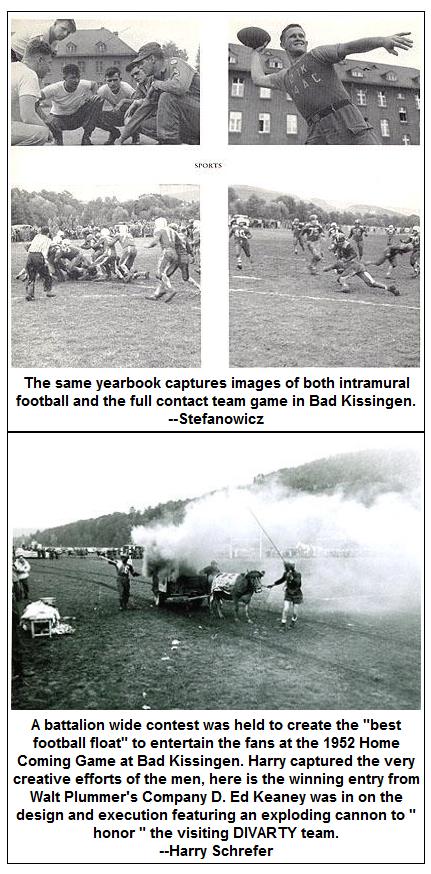
Between the border and the normal training and maintenance cycles,
the 2 - 14 ACR was certainly busy but there was sufficient time
remaining for a full unit sports program to include both traveling
teams and intramural sports. In the days before AFN, liberal POV
policies and stereos in every barracks room, once the duty day ended
for the troopers on the hill, the games began. The competition
fostered morale, allowed soldiers to blow off steam and get some
additional exercise. For those not directly involved as players,
watching the games, maintaining statistics, assisting in half time
entertainment and perhaps even placing a few side bets were all part
of the evening and weekend plans.
Troop level touch football with partial uniforms was played by the
armored cavalry starting in the first days after the move from
Schweinfurt. Photographs, trooper recollections and the 1952
yearbook all recall the games as a major event in the Fall. The
yearbook contains no less than seven photos of football, both flag
and full contact, most of which appear to be taken at Daley
Barracks. Special consideration was not generally given to the
troopers on the teams. The border or training always came first.
If touch football was good, tackle football
with full uniforms was even better. Beginning in the Constabulary
days and in full swing well into the 1950s, an Army league existed
in Germany, the teams appear to have been formed at both the
division level and as consolidated unit efforts in cities with large
US troop populations.
The 14th ACR formed a team drawing on troopers from all three host
cities named, the "Red Raiders" and there was a major Bad Kissingen
connection. Dailey Barracks was the site of the annual football
"Summer camp" and several games were played there once the field was
surveyed in. Other league teams were formed in Munich, Wurzburg and,
in Berlin, tapping both German and American traditions, the US Army
football team was named the Bears.
How the league was organized, the exact location and names of all
teams and total number of games played is still being researched;
unfortunately, the Officer of the USAREUR Historian had very little
on the topic. Veterans from Bad Kissingen recall that the Red
Raiders won the championship at least once in the early 1950s. By
1954, however, the 14th ACR yearbook contains only a single image
related to football.
The next yearbook on hand, published in 1960, shows full contact
ball is back at Daley, as part of the consolidated 14th Regiment
team. In 1963, we look to the 2nd ACR unit yearbook for evidence of
football and it indicates that at least for them, the game had
switched to flag football; this probably represents what the balance
of the US Army in Germany was doing. It may have been that the full
contact league gained or lost significance as a matter of senior
command interest.
Flag Football
In 1976, Gary Cuda in H Company recalls that at least flag football
was still a matter of unit pride.
"I do remember we had a Sp/4 Don Rogers (CSM Ret) and he threw a
pretty good football. He didn't like to be told what play to run,
but give him the ball and the results were usually pretty good. He
had a southern accent, and was sort of a ‘ good old boy ‘ but really
was a good Joe! H Co. won the Eaglehorse Squadron title in flag
football that Fall of '76. I was the player/coach who played both
ways on the team, and ended up hurting my foot pretty bad in a hole
that no one noticed in the field until I stuck my foot in it."
"So I became the ‘coach ‘ and we went to Schweinfurt for the
playoffs. If I remember correctly, I started another guy as QB but
then switched to Don as QB. He made some gains, but the damage was
done, and we lost in the playoffs. It was a great time except for
the loss, since all of us loved to play football. I remember it was
a lot of fun for all the guys."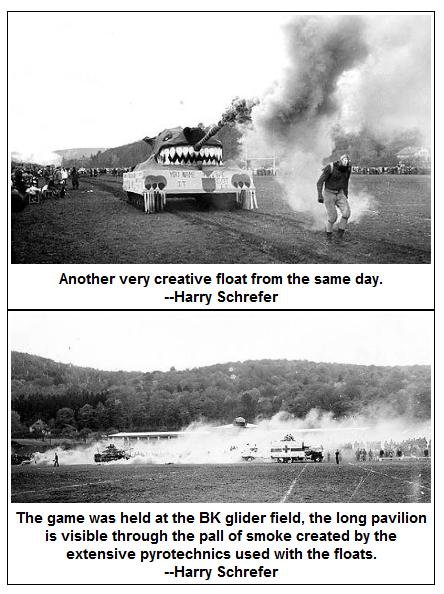
Robert Stefanowicz
"Coming into the late 1970s, unit sports programs were a very
important part of the quality of life initiatives in the Army. While
ARTEP, AGI and gunnery results were of primary importance,
successfully unit sports programs were also part of the winning mix.
Each Company - Troop - Battery was strongly encouraged to field flag
football, softball, basketball and volley ball teams. I recall the H
Company team had a proud tradition supported by both CPTs Snedden (LTC
Ret) and Dilday, (MAJ Ret). There was an organized set of game
brackets to determine the squadron level champion who then
progressed to playoffs in Fulda. There may have been games against
the 2 - 41 FA at Daley as well as VII Corps teams in Schweinfurt. A
few years later with Troop G, CPT Terry Campbell (LTC Ret) was also
a very strong supporter of his teams. The size of a cavalry troop
had really grown and there were a lot of troopers with energy to
burn and a willingness to play."
"The other odd thing I recall about football in Bad Kissingen during
those years was that the ABC TV Monday Night Football game was a big
social event if you had the chance to catch it on AFV ... I think
the tape was run on Wednesday or Thursday night. Needless to say,
there wasn’t much betting on the outcome!"
Ted Prescott picks up the story through the mid 1980s
.
"I don't recall much about the Troop level teams. I remember playing
in one game but I don't recall a lot of specifics. Obviously, we
must not have won any honors! Here is what I do recall."
The Fulda Ice Bowl, New Years Day 1986
"One year the Eaglehorse had an officer's team that competed for the
Regimental title. The Squadron put together a team that would play
at Fulda on New Year's day against the other squadrons. Following
the games was an informal reception with the girlfriends and wives
at the Officers Club in Fulda. Of course, it had snowed and it was
cold, but there was an additional hazard for this game. New Years
Eve."
"In a traditional cav celebration, I hosted a New Years Eve party at
my house in Euerdorf in which the beverages and music flowed until
about 4 AM. Departure time for Fulda was at 6AM. Anyway, we all
climbed on board the bus with a great deal of the team still
suffering from the effects of over indulgence and made our way to
Fulda to engage the enemy. Also, the wives and girlfriends were on
the bus and they had to suffer through a full morning of football
like the rest of us."
"We arrived there for what I believe had been dubbed the Ice Bowl.
It was so cold the wives stayed huddled in the bus. As for the
players, we had enough alcohol in our blood that it
must have served
as antifreeze. We won our first game of the tournament under the
guidance of our SIGO quarterback, Rob Prudhomme (sic). However, by
the second game we were so tired from the party the previous night
that there hardly seemed to be any energy. We lost and don't even
remember which squadron won. No doubt, they probably cheated
anyway."
"Afterward, we met in the warm environment of the Officers Club for
about an hour before another approaching ice storm sent the
traveling squads back to the autobahns. I wonderful time was had by
all!"
While the Germans introduced beer in one liter steins and
Volksmarchs to the American Army, we did our best to entertain
ourselves and our hosts with American football. Soccer has some
merits I guess, and it certainly has spread in our society,
particularly in the schools, but why just chase a ball and kick it
... when you can throw it around and tackle players at full speed?!
We note that NFL Europe has some level of success although I can
never recall if it is the Rhine Fire or the Frankfurt Fanatics ...
anyway, somewhere between Grafenwoehr and Giebelstadt, more than a
few US troopers are still tossing the ball around, unit commanders
carefully check out the flag football schedules and many younger
Germans have an understanding of the game first observed by their
grandparents in post war Bad Kissingen.
|
|